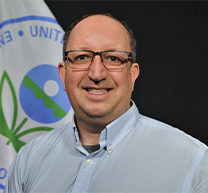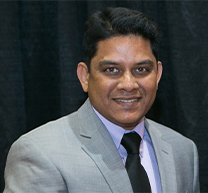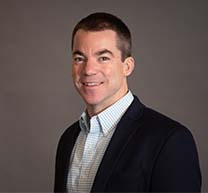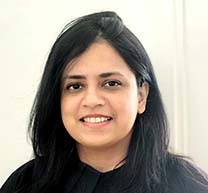GEC at eSummit 2024
SUSTAINABILITY LEADERSHIP: NEXT GENERATION EPEAT ECOLABEL CRITERIA AND STAKEHOLDER SUPPLY CHAIN PERSPECTIVES
Wednesday • October 23 • 2:00 – 3:45 pm CT
Join the Global Electronics Council (GEC) at the eSustainability Summit for a special session where we will introduce the next-generation EPEAT® ecolabel criteria. Launching in 2025, these new criteria will set the market expectation for the sustainability of ICT products in four priority areas: climate change, circularity, chemicals, and responsible supply chains.
This session is a unique opportunity for industry professionals to gain early insight into the updated criteria and hear directly from stakeholders across the ICT supply chain. Whether you are a purchaser, supplier, or recycler, you’ll learn how these changes will impact your sustainability goals and operational practices.
Featured speakers

Chris Newman
Environmental Scientist, EPA

Puneet Shrivastava
Principal Engineer, Dell
David Hirschler
Chief Sustainability Officer, ERI

Bob Mitchell
Chief Executive Officer, Global Electronics Council

Shahana Althaf, PhD
Event Agenda
October 23, 2024
2:00 – 2:10 Introduction to GEC & EPEAT
2:10 – 2:40 Overview of EPEAT Updated Criteria
2:40 – 3:20 Stakeholder Prospectives on the Next Generation of EPEAT Ecolabel Criteria
3:20 - 3:30 Q&A & Wrap-up
This session will offer valuable insights into the future of sustainability for ICT products, with a focus on the circularity criteria. Industry leaders will share their perspectives on the implementation challenges and opportunities posed by the new standards.
Stay ahead of the curve by joining us to explore how the next generation of EPEAT criteria will help shape the sustainable technology landscape for years to come.
Contact us at criteria@gec.org for questions or more information.
More about SERI
SERI’s role is to bring all those disparate parts together to bring about real change. This unique organization is the only multi-stakeholder, collaborative nonprofit organization in the world focused exclusively on minimizing the environmental and health risks posed by used and end-of-life electronics, while also maximizing the social and economic value presented by this equipment. SERI wants everyone to think about electronics differently, to act more responsibly, and to make decisions with our electronics using sustainability as our guiding North Star. Because when we do, we’ll protect people and the environment, while making sure our electronics do a world of good.
More about the Global Electronics Council
The Global Electronics Council (GEC) accelerates systemic change to create a 100% sustainable electronics industry by 2050.
- This means net-zero emissions, zero waste, water neutrality and minimal adverse impact on the environment and human rights throughout the life cycle of products and services.
- As stewards of the EPEAT ecolabel, we set the global standard for sustainable electronics.
- We empower electronics manufacturers and buyers to meet their sustainability goals through our world-leading accreditation, advocacy and leadership.
- We are reshaping the world’s relationship with technology and natural resources and enabling the transformation of electronics from an escalating environmental and social challenge into an empowering, sustainable solution.
Our work accelerates change across four critical areas of action:
- Climate action: Guide the market to reduce greenhouse gas emissions in the manufacture, supply chains and use of electronics.
- Circularity: Ensure electronics producers design their products and packaging for longevity, reuse and recycling with a view to eliminate all waste from the industry.
- Chemicals of concern: Help eliminate the use of toxic chemicals that are hazardous to human health and the environment.
- Responsible supply chains: Safeguard responsible material sourcing, fair labor practices and worker health and safety in the electronics supply chain.

David Hirschler
Chief Sustainability Officer, ERI
David Hirschler is the Chief Sustainability Officer at ERI, the nation’s leading recycler of e-waste. David is responsible for ERI’s internal and external sustainability and circularity initiatives as well as ERI’s legislative responsibilities covering the gamut of producer responsibility regulations through data protection regulations. In addition, David serves as president of the board of FABSCRAP, a nonprofit organization focused on the recycling and reuse of commercial textile waste. David has worked in the recycling field for more than 20 years and holds a Master’s Degree in Urban and Environmental Policy and Planning from Tufts University.

Chris Newman
Environmental Scientist, EPA
Chris Newman is an Environmental Scientist with the United States Environmental Protection Agency. He has worked on the sustainable materials management and end-of-life management of electronics for over 20 years. He has worked with state environmental agency staff from the upper-Midwest to support development and management of their state e-waste programs. Chris has been involved in development of criteria for several sustainable purchasing standards that cover electronic products and worked with federal stakeholders to develop end-of-life management resources for electronics, programs that help improve the management of electronic assets, and other sustainable practices. As technology’s progressed, he’s also become involved in lithium battery and photovoltaic issues, as well as critical minerals. Chris is also a steering committee co-chair for the International E-waste Management Network, which is a partnership between U.S. EPA and Taiwan’s Ministry of Environment that helps to improve e-waste management in partner countries around the globe.

Puneet Shrivastava
Principal Engineer, Dell
Puneet is the Domain Lead for Eco-design and Restricted Materials in the Compliance Architecture team at Dell. With over 16 years of experience in Dell’s product compliance team, Puneet has led several eco-design, materials, and product takeback compliance programs. He played a pivotal role in establishing the industry’s first certified closed-loop recycled plastic program, he was in the technical committee that work on major revision of the R2V3 standard. Puneet also ensured that all of Dell’s ITAD partners got certified to the R2V3 standard. He spearheaded the transition to digitize the material declaration of conformity processes, significantly increasing efficiency and transparency of parts approval process.
For the past two years, Puneet has been an active member of the GEC’s Sustainable Use of Resources and Chemicals of Concern technical committee, working on the upcoming standard revision and representing Dell. Currently, he collaborates with multiple stakeholders both within and outside Dell to ensure that product sustainability remains a top priority.

Shahana Althaf, PhD
Research Scientist, Sustainability Criteria Development
As Research Scientist, Sustainability Criteria Development, Dr. Shahana Althaf conducts the research on life cycle environmental and social impacts of electronics to develop environmental performance metrics and tools for quantifying the benefits of sustainable technology products. She also performs market analysis of technologies for developing the road map to broaden GEC’s mission impact.
Dr. Althaf brings over nine years of sustainability research experience from both academic and corporate sector projects. Prior to joining GEC, she worked as a Sustainability Scientist for a corporate greenhouse gas accounting consultancy where she led corporate foot printing projects for electronics and textile sector clients for over two years. She has served as an individual contractor for the United Nations agency UNITAR for conducting research on electronic waste management in the Americas and is one of the authors of the UN’s Global E-waste Monitor 2024 report.
Dr. Althaf has a Ph.D. in Sustainability and a master’s degree in Telecommunications Engineering from the Rochester Institute of Technology, USA. Her bachelor’s degree is in Electronics and Communications Engineering. After her Ph.D., she worked as a post-doctoral associate at Yale University’s Center for Industrial Ecology for over two years. During her post-doctoral tenure at Yale, she also served as a Fellow of the World Economic Forum’s Global Future Council for Net Zero Transition. Dr. Althaf has published several high impact journal articles, book chapters and reports on the topic of sustainability in the electronics sector. Her research has won awards such as The Journal of Industrial Ecology best paper prize – Graedel Prize 2020 and RCR best paper award 2019. She is based in Rochester, New York.

Bob Mitchell
Chief Executive Officer, Global Electronics Council
As Chief Executive Officer of the Global Electronics Council, Bob provides leadership and strategic oversight of the organization to fulfill its vision and mission. He brings a deep background in business & human rights, environmental sustainability, non-profit management and corporate sustainability & programs.
As former Vice President of Human Rights & Environment at the Responsible Business Alliance (RBA), Bob led the strategy development and implementation for responsible business conduct programs in a multi-industry, multi-stakeholder environment. In this role, he drove the inception and launch of significant efforts in areas such as Forced Labor Due Diligence, Decarbonizing Supply Chains, Circularity and Supply Chain Resiliency.
He is a veteran of Hewlett Packard and Hewlett Packard Enterprise, with over a decade and a half working in the sustainability field. Prior to working at the RBA, he was Director, Global Social & Environmental Responsibility at Hewlett Packard Enterprise, leading a team of professionals in human rights, product environmental stewardship, supply chain responsibility and conflict minerals, among other issue areas. Bob also served on the RBA Board of Directors and Advisory Board of Social Accountability International (SAI). He holds an MBA from the University of Arizona, and a bachelor’s degree from the University of Virginia.

